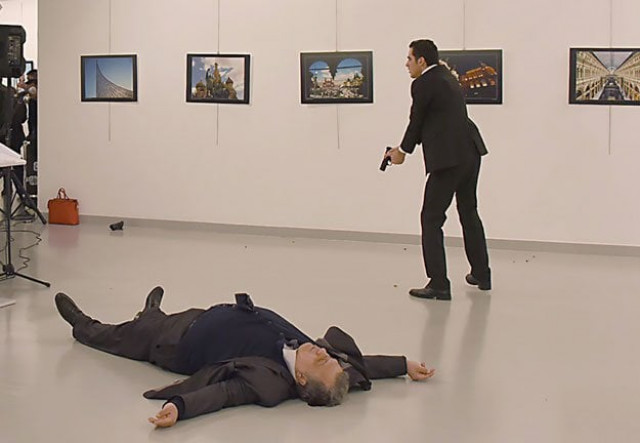An assassination in Turkey
The murder of Mr Karlov may be seen as part of the backlash in Turkey against Russian actions in Syria

The murder of Mr Karlov may be seen as part of the backlash in Turkey against Russian actions in Syria. PHOTO: AFP
Turkey and Russia have a relationship that has in recent times been tendentious at best and toxic at worst. Turkey shot down a Russian aircraft that had allegedly and briefly violated its airspace on 24th November 2015. Both countries have supported opposite sides in the fiendishly complex Syrian civil war. Both countries are powerful regional players across a spectrum of geopolitical issues, with Russia in particular seeking to establish itself in the Levant and eastern Mediterranean generally. Both countries share a common enemy in the Islamic State which may well be the thin glue that holds them together in the short term.

The murder of Mr Karlov may be seen as part of the backlash in Turkey — there have been street protests — against Russian actions in Syria. The assassin was heard on-camera to shout ‘Don’t forget Aleppo’ and ‘Don’t forget Syria’ as he fired, followed by other comments in Turkish and Arabic. He was killed shortly afterwards in a shootout with police and several of his family and associates have been arrested by the Turkish authorities.
Russian President Vladimir Putin moved quickly to make it clear that the incident was to be seen as a ‘provocation’ and as such would not be responded to as the attacker may have hoped, thus applying the diplomatic handbrake. Further emollient was applied by Russian foreign minister Sergei Lavrov who called his Turkish counterpart Mevlut Cavusoglu. There is to be a meeting between the foreign ministers of Russia, Iran and Turkey on Tuesday 20th December to discuss the Syrian conflict, and it has been decided that the murder of Mr Karlov is no reason to delay or cancel that meeting.
There are a number of take-aways from the incident of direct relevance to Pakistan, not the least of these being that insider-terrorism is an ever present risk. There are parallels between the murder of Mr Karlov and the murder of the governor of Punjab Salmaan Taseer by one of his own security guards. Let it not be forgotten that Indira Gandhi was also assassinated by two Sikh members of her security detail. Both of those events were driven by ideological engines.
Further to the above there is the ease with which political murder is facilitated by the increasing need for ever tighter security around political figures. The man who killed Mr Karlov was a trusted member of the security forces. So was the man who killed Salmaan Taseer and so were those that killed Mrs Gandhi. Pakistan politicians conduct their public business with some distance between themselves and the general public and that from behind a bullet-proof rostrum (Imran Khan being something of an exception) and must be aware of the very real risks they run. That those risks may be created or exacerbated by the policies they espouse may be less obvious to them, but the politics of division are fertile seed-beds for the assassin with an axe to grind.
There is no shortage of axes to grind when it comes to Russia and Turkey, and the fumbling incompetency, multiple and prolonged, displayed by other great powers in respect of the Syrian conflict have opened several windows through which opportunists have duly piled. Imperial Russia is foot-forwards, Iran likewise and Turkey emergent. The assassination of Mr Karlov is tragic, but it is not a modern Sarajevo moment.
Published in The Express Tribune, December 21st, 2016.
Like Opinion & Editorial on Facebook, follow @ETOpEd on Twitter to receive all updates on all our daily pieces.















COMMENTS
Comments are moderated and generally will be posted if they are on-topic and not abusive.
For more information, please see our Comments FAQ